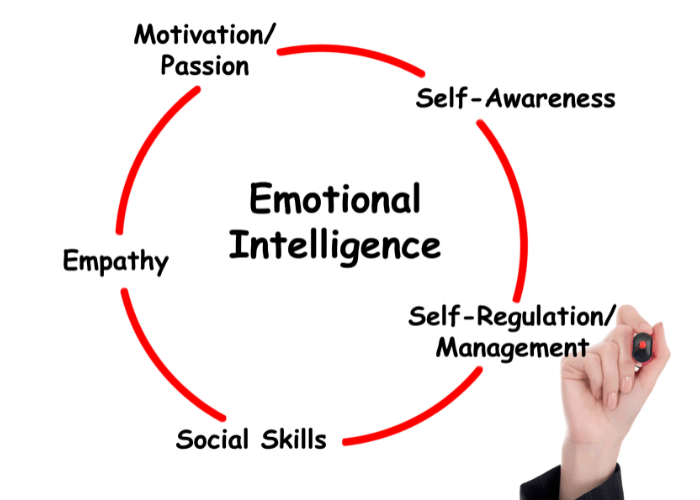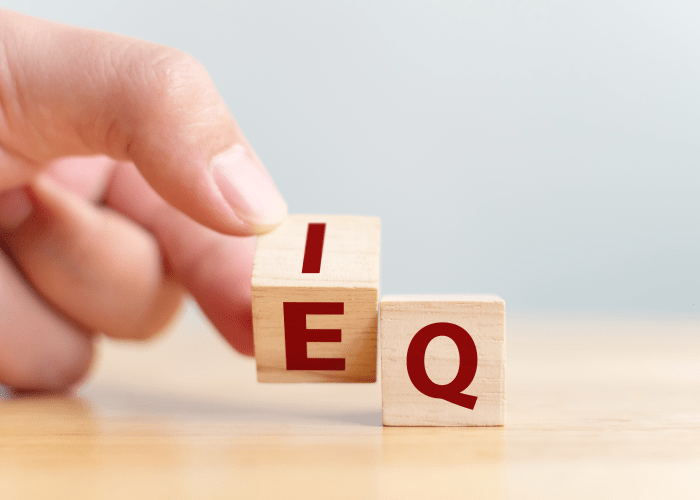Can High Emotional Intelligence Make Your Own Life Better?
Emotional intelligence, also referred to as EI or EQ (Emotional Quotient), was first mentioned in the second half of the 20th century and has been increasingly researched as a concept ever since.
Suppose you’re not specialising in interpersonal communication or self-development strategies. In that case, you probably still consider emotional intelligence a trait that mainly benefits the people around you.
Anyway, a person with high emotional intelligence is likely to experience some rather beneficial consequences of it. And today, we are telling you more about them!
First Things First: What is High Emotional Intelligence?
Looking for the shortest possible explanation to EI? Basically, that is the ability to understand and manage your own emotions, as well as the emotions of the people around you.
In a fundamental writing on the subject, psychologist Daniel Goleman identifies five elements that add up to each other to build a high level of emotional intelligence, and these are:
Self-awareness
Self-awareness, self-assessment, and self-confidence are among the most fundamental emotional intelligence traits in an individual.
These are the mindfulness-based mechanisms through which you understand yourself, recognize the impact of your emotions on your behaviour, and maintain a positive feeling of self-worth.
Self-regulation
Recognizing your emotions is one thing, but controlling them is a world of its own. Self-regulation is all about staying in control and not letting your emotional dynamics mess with your overall values and definitions of acceptable behaviour.
This high emotional intelligence element might require working on your anger-management skills, adapting mechanisms, and willingness to take responsibility for your actions. It’s not just about deep breathing – it’s about allowing yourself to stay yourself, even in the most challenging situations.
Motivation
It also goes by the name of self-discipline, or the ability to keep your focus, even when your emotions are calculating some pressure. Motivation has a lot to do with goal-setting, achievement celebration, and keeping your sense of purpose – both personally and professionally.
Emotionally intelligent motivation has nothing to do with compulsive multitasking or designing the perfect burnout scenario. Instead, it has to do with keeping your integrity, even if emotional distractions get in your way.
Empathy
Some people are natural empaths, while others learn on the way. This fundamental soft skill is all about genuinely trying to understand someone else’s viewpoint and walking a mile in their shoes before you act or react.
Empathy involves a lot of active listening, emotion recognition, and compassion. This is especially important when you don’t share a background with the person in front of you – including cultural predispositions, religious views, or even a value system.
Social Skills
Social skills and relationship management will play an important role in both your career development and your personal life story. So, the broader “social skills” term actually stands for:
- Staying present and actively reading the air in the group of people around you;
- Showing organisational awareness and the ability to motivate behaviours in people;
- Building social networking and decision-making paths where everyone’s concerns are taken into consideration;
- Adapting to a changing situation and helping others adapt stress-free as well;
- Supporting others in their pursues, abilities, talents, and inspirations;
- Resolving conflicts and disagreements in a collaborative and respectful way;
- Helping people and groups feel safe, appreciated, and cooperative;
- Building bonds between members of the group, yourself including.
The list can go on forever, but you already get the point – social skills are all about making communication a pleasure rather than a burden.
And if all of the above sounds way too abstract for you – you can always take the professionally designed emotional intelligence test of Psychology Today to see where exactly you are standing on the scale.

Benefits of High Emotional Intelligence
You can recognize a highly emotionally intelligent person by their ability to stay focused, present, and resilient in challenging situations. They seem to always find a way to demonstrate respect towards themselves and others, manage difficulties with dignity, and act as a reflector that shows everyone’s strengths and weaknesses in a constructive way.
Yes – everyone loves being around these types of people, and everyone benefits from being this type of person.
- Showing high emotional intelligence in the workplace can easily make you a natural leader and opinion-maker in your professional community.
- High emotional intelligence can improve your relationships with others, making you a preferred friend, relative, co-worker, partner, or significant other.
- Being an emotionally intelligent parent will help you raise strong, confident, and respectful children with healthy boundaries.
- High emotional intelligence is proven to enhance the overall physical and mental well-being of all genders, ages, and cultural backgrounds.
- Research shows that people with high EQ will earn on average £22,000 more per year – so yes! – that self-improvement tactic is also profitable.
- Emotional resilience and awareness will help you make smarter decisions and pursue your long-term goals without being trapped in short-term drama.
At the end of the day, the EQ superpower will improve your performance in all areas of life and will help you act and feel like a valued member of society instead of a lone wolf that hardly keeps it together.

Can You Improve Your Emotional Intelligence?
In contrast to conventional intelligence or IQ, emotional intelligence is something you can actively work on. Of course, different temperaments are not equally susceptible to radical changes. Still, a smart strategy and consistency can get you a long way.
Some techniques for improving your emotional intelligence can be:
- Practising emotion recognition with both friends and strangers;
- Engaging in practices of mindfulness, meditation, and body scanning;
- Working on your focus, concentration, and goal-setting;
- Expanding your social bubble and staying open-minded towards diversity;
- Practice active listening and focus on people’s statements rather on your replies;
- Learn to give and receive constructive criticism without hard feelings;
- Don’t avoid analysing your feelings and cross out escapism from your coping mechanism list.
Though easier said than done, these tactics will help you further improve your emotional response and enjoy all the benefits of controlling your feelings instead of letting them control you.
The good news? Your journey with RelaxifyApp will take you through all the steps described above with some fun and engaging games to play on the go. So – all you need to do is make the first step and walk the rest of them together with us!

